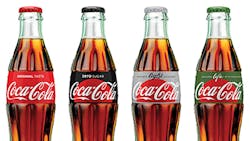BEIJING — Coca-Cola workers in three Chinese cities have gone on strike after the soft drink giant announced it was selling its bottling interests in the country.
Strikes and other labor protests have surged in recent years in China, where growth is slowing and parts of the economy are moribund.
The beverage giant announced last week it was selling all its bottling assets in mainland China to Hong Kong conglomerate Swire Pacific and COFCO Corporation, one of China's state-owned food giants. The Swire transaction would cost 5.87 billion yuan ($848.76 million), the Hong Kong company said. COFCO did not disclose the size of its deal.
Workers at three Coca-Cola plants called coordinated strikes on Monday, with pictures posted online appearing to show workers outside a factory in Chongqing with a banner that read: "We worked hard for over a decade but were sold in less than a second. Compensate! Compensate! Compensate!" Another proclaimed: "Give back my youth, compensate my time".
Simultaneous strikes also took place in Chengdu, also in the southwest, and Jilin province in the northeast, other photos on social media showed. One worker told AFP that more than 600 staff went on strike in Chengdu.
Separately, workers at a Sony factory in the southern city of Guangzhou have downed tools in protest at the sale of the Sony Electronics Huanan subsidiary, which managed the site, to a Chinese company, the Japanese electronics giant said Thursday.
Production at the smartphone camera parts facility, which employs 4,000 people, has been halted for two weeks after Sony announced earlier this month it had been sold to Shenzhen O-Film Tech. Protesters fear working conditions and pay could suffer and are also concerned about possible job cuts.
"I have been working for the Japanese group for ten years, with a good level of salary and allowances," Liu, an employee on strike, told AFP. But she added all that could now change under the ownership of the Chinese firm. "Everyone knows that in its factories, wages are mediocre, there are many layoffs many, and it imposes unpaid overtime," Liu said.
Labor protests have erupted in China with economic growth slowing, and closing factories often leaving workers with unpaid wages and no redundancy pay. According to data from Hong Kong-based rights group China Labour Bulletin (CLB), there were 2,774 strikes and labor protests across the country in 2015 — more than the previous four years put together — with unpaid wages the most common grievance.
Independent trade unions are banned in China, with only the official All-China Federation of Trade Unions legally recognized. But critics say it often fails to assist workers in disputes. Officials pay close attention to unrest that could upset social stability, which the ruling Communist party seeks to maintain.
The Coca-Cola bottling plant workers fear that they will lose their jobs or pay under the state-owned employer, one striking employee told AFP.
"We are demanding the company disclose details of the re-franchising and plans during the transitional period," he said. "We request the company give workers economic compensation before they decide to sign the contract with COFCO."
According to posts on social media, police clashed with strikers at the Chongqing factory, with video showing police pushing a cluster of workers in red uniforms and officers photographed subduing a struggling man. Police officials in Chongqing said they had no information on such incidents when contacted by AFP.
Similar strikes broke out in 2011 when workers at five Pepsi bottling plants across China protested after the US beverage giant sold its plants in the country to a Japanese-Taiwanese venture.
Copyright Agence France-Presse, 2016
About the Author
Agence France-Presse
Copyright Agence France-Presse, 2002-2025. AFP text, photos, graphics and logos shall not be reproduced, published, broadcast, rewritten for broadcast or publication or redistributed directly or indirectly in any medium. AFP shall not be held liable for any delays, inaccuracies, errors or omissions in any AFP content, or for any actions taken in consequence.
